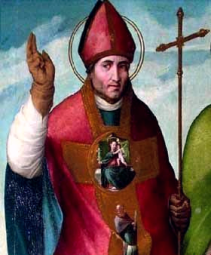Lives of the Saints
Our Models and Protectors
Spiritual Bouquet:
"My sheep hear My voice, and I know them and they follow Me."
St. John 10:27
June 7

Saint Claude
Archbishop
(607-699)
The province of Eastern Burgundy has received great luster from this glorious Saint. He was born at Salins in the early seventh century, and was recognized from his youth as having a lively mind, a solid judgment and great docility. He read with devotion the sacred books, the lives of the Martyrs and holy Confessors, and the sermons of the Doctors of the Church, all of which were then far more frequently found in the hands of the faithful. He spent many hours praying in the church and attended Mass daily; he was careful to avoid any places which could be a danger for his faith, and took pleasure in frequenting pious persons who could give solid nourishment to his soul.
At the age of 20 he became a member of the cathedral chapter of Besançon, where he remained for twelve years, following the examples of the archbishop, Saint Donatian. Afterwards he retired to the monastery of Condat or Saint Oyend, where he became Abbot at the age of 37, in 644; and under his government many Saints were formed.
He had become both the model and the oracle of the clergy of Besançon when, upon the death of Archbishop Gervase in the year 685, he was named as his successor. Fearing the obligations of that charge, he fled to a retreat, but was discovered and compelled to accept the burden. During seven years he acquitted himself of the pastoral functions with the zeal and vigilance of an apostle. It was said that his sermons had so great a force that they tore vice out of the hearts of the most hardened.
When he was eighty-six years of age, he retired once more to the monastery of Saint Oyend, of which he had always retained the title of Abbot, and where he then remained in authority as its head for several more years. Such was the sanctity of his life and his zeal in conducting his monks in the paths of evangelical perfection, that he was compared to the great abbots of Egypt, Saint Anthony and Saint Pachomius, and his monastery, to those of ancient Egypt. Manual labor, silence, prayer, reading of pious books, especially the Holy Bible; fasting, watching, humility, obedience, poverty, mortification, and the close union of their hearts with God made up the whole occupation of these fervent servants of God. These virtues were the rich patrimony which Saint Claude left to his disciples.
Saint Claude died in 699 at the age of ninety-two, and his body was found intact in the 12th century. Since then pilgrimages and miracles have abounded at his tomb, placed in the monastery where he died, which afterwards bore his name. His feast has been celebrated since the end of the 15th century.
Les Petits Bollandistes: Vies des Saints, by Msgr. Paul Guérin (Bloud et Barral: Paris, 1882), Vol. 6